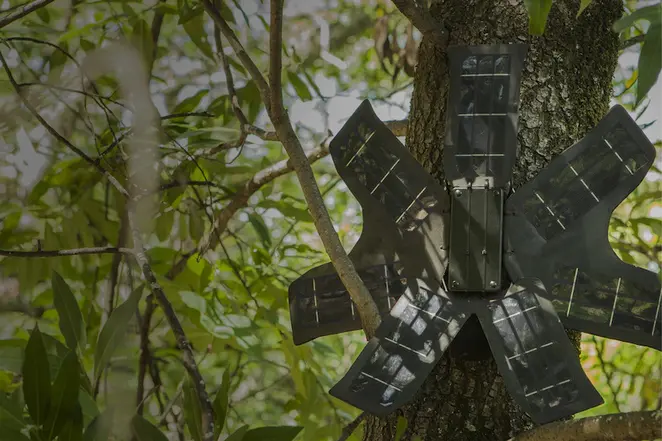
By turning recycled smartphones into solar powered listening outposts in rainforests, Rainforest Connection is using yesterday’s gadgets to help preserve tomorrow’s forests.
Even for those of us who live nowhere near a rainforest, illegal logging can still have an impact on us, because it’s helping to drive climate change and species extinctions, which ultimately affect all of us on the planet.
One of the problems with attempting to stop illegal logging in rainforests is a lack of effective monitoring solutions, and because most of the illegal logging activity comes from small operations, detecting it with satellite technology can only take place after the fact, and only if the affected area is big enough to be seen from space.
A creative solution to halting illegal logging in the world’s rainforests effectively turns old smartphones into autonomous listening devices that can be set up to monitor the forest for the sound of chainsaws, and then send out alerts in real-time, which could help authorities to intervene before too much damage has occurred.
We previously covered this project last summer, but this time, the Rainforest Connection (RFCx) is launching a much more ambitious initiative, which aims to crowdfund the building and deployment of enough devices to cover up to 300 square kilometers of rainforest in Brazil and Africa in two pilot programs. If sufficient funds are raised, and the pilot programs are successful, RFCx plans to scale up this rainforest conservation system and begin covering larger areas in both Asia and Latin America.
The RFCx system allows a single recycled smartphone to monitor three square kilometers of rainforest, and by powering the devices with small solar panels, the need for batteries or other remote power supply is removed.
By leveraging the existing wireless communications network (which blankets large areas, even in remote locations) and using recycled smartphones, RFCx could change the landscape of illegal logging monitoring, in a low-cost and low maintenance manner.
The RFCx devices are installed high in the tree canopy (hidden from plain sight), and will continuously capture all ambient sound around it. The devices are able to detect the sounds of destructive rainforest activities (sounds of logging and chainsaws, gunshots, or distress signals) up to 1 km around it. When a device detects any of these sounds, it will send an alert to the RFCx cloud server, which then sends out an SMS message to first responders in the area, so they can attempt to halt the illegal activity.

“Why use old, recycled smartphones to guard the rainforest? Because it’s simple, inexpensive and it works.
Smartphones are arguably the most efficient, advanced, and well-understood computers available on the market today, and each year, more than 150 million phones are discarded in the United States alone. Rainforest Connection can take this “trash” and put it to use immediately.”
By using recycled smartphones to listen for the sounds of illegal logging and poaching, RFCx claims that each device deployed in the forest can protect enough trees to prevent up to 15,000 metric cons of CO2 from being emitted into the atmosphere, which is said to be the equivalent of taking 3000 cars off of the roads. And in addition to making use of these recycled devices instead of new, purpose-built ones, the solar panels that power them are also an example of repurposing and recycling, as they are made from crystalline silicon fragments that would normally get discarded.
As part of this RFCx initiative, a web and mobile app is being released later this year, which will allow project backers to livestream the sounds of the rainforest in the Amazon and Africa, bringing a little bit of wild nature into our modern lives.
To find out more about how you can help crowdfund this innovative rainforest monitoring system, see the Kickstarter campaign page, or Rainforest Connection’s website, where you can learn how to donate your old phone for use in protecting forests from illegal logging.







